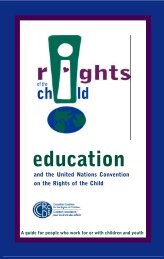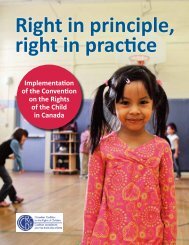Poste - Canadian Coalition for the Rights of Children
Poste - Canadian Coalition for the Rights of Children
Poste - Canadian Coalition for the Rights of Children
Create successful ePaper yourself
Turn your PDF publications into a flip-book with our unique Google optimized e-Paper software.
C A N A D I A N C O A L I T I O N F O R T H E R I G H T S O F C H I L D R E N<br />
When <strong>the</strong> family lands in Canada, <strong>the</strong>y immediately<br />
become permanent residents.<br />
Over half <strong>of</strong> <strong>the</strong> refugees who are landed in Canada<br />
each year claim Convention refugee status at a border<br />
point or from within <strong>the</strong> country (“inland”). If <strong>the</strong> person<br />
is accepted as a Convention refugee, he or she is eligible<br />
to apply <strong>for</strong> permanent resident status. Immediate family<br />
members, whe<strong>the</strong>r in Canada or abroad, may be included<br />
on <strong>the</strong> application <strong>for</strong> permanent residence. If <strong>the</strong> person<br />
is not found to be a Convention refugee, he or she faces<br />
deportation from Canada. According to <strong>the</strong> Joint Centre<br />
<strong>of</strong> Excellence <strong>for</strong> Research on Immigration and<br />
Settlement—Toronto:<br />
Among all industrialized countries, Canada has one <strong>of</strong> <strong>the</strong><br />
most generous rates <strong>of</strong> acceptance <strong>of</strong> refugee claims: in<br />
1992, when Italy, Belgium, and Norway granted asylum to<br />
only 10 percent <strong>of</strong> refugee claimants and Germany to only<br />
4 percent, Canada accepted more than 50 percent <strong>of</strong><br />
refugee claims. 11<br />
The number <strong>of</strong> refugee claims made in Canada has<br />
increased from 500 in 1977 to 24,000 in 1997. 12 Andrew<br />
Brouwer, manager <strong>of</strong> <strong>the</strong> Refugee and Immigrant Program<br />
<strong>of</strong> The Maytree Foundation, says that “<strong>the</strong> increasing<br />
accessibility <strong>of</strong> international travel means that it is <strong>of</strong>ten as<br />
easy or easier <strong>for</strong> refugees to flee directly to Canada than<br />
to seek temporary asylum in a neighbouring country first.<br />
O<strong>the</strong>rs live ‘underground’ in a neighbouring country <strong>for</strong> a<br />
time be<strong>for</strong>e making it to Canada to claim asylum.” 13<br />
According to <strong>the</strong> Auditor General, <strong>the</strong> “current practice<br />
dictates that from <strong>the</strong> time claimants arrive in Canada, and<br />
<strong>for</strong> as long as <strong>the</strong>y remain and <strong>the</strong>ir claim is making its<br />
way through <strong>the</strong> process, <strong>the</strong>y qualify <strong>for</strong> many <strong>of</strong> <strong>the</strong><br />
benefits granted to landed immigrants, such as social<br />
assistance, legal aid, education and health care. The<br />
provinces, in administering <strong>the</strong>se benefits, thus have some<br />
influence on refugee-related issues.” 14<br />
Refugees Landed in Canada 15<br />
1997 1996 1995<br />
Government-Assisted 7,710 7,846 8,191<br />
Privately Sponsored 2,660 3,073 3,251<br />
Refugees Landed in Canada 10,629 13,842 13,778<br />
Dependents Abroad 3,223 3,554 2,535<br />
Total Refugees 24,222 28,315 27,755<br />
102<br />
Legislation<br />
Canada’s legislation governing immigration and refugees<br />
is <strong>the</strong> Immigration Act (1976-77, c.52, s.1), which was<br />
passed in 1976. Citizenship and Immigration Canada is<br />
<strong>the</strong> federal department that administers <strong>the</strong> Act. The<br />
definition <strong>of</strong> refugee, which has been incorporated into<br />
<strong>the</strong> Immigration Act (s.2.(1)), comes from <strong>the</strong> 1951<br />
United Nations Convention Relating to <strong>the</strong> Status <strong>of</strong><br />
Refugees and its 1967 Protocol. The United Nations<br />
Convention on <strong>the</strong> <strong>Rights</strong> <strong>of</strong> <strong>the</strong> Child has not been<br />
incorporated into <strong>the</strong> Immigration Act or Regulations.<br />
<strong>Canadian</strong> law allows <strong>for</strong> children to make <strong>the</strong>ir own<br />
refugee claims. The Immigration Act does not set out<br />
specific procedures or criteria <strong>for</strong> dealing with <strong>the</strong> claims<br />
<strong>of</strong> children, however, except <strong>for</strong> <strong>the</strong> designation <strong>of</strong> a<br />
person to represent <strong>the</strong> child in Immigration and Refugee<br />
Board hearings.<br />
The Immigration Act stipulates that refugee claims are<br />
to be heard by <strong>the</strong> Convention Refugee Determination<br />
Division <strong>of</strong> <strong>the</strong> Immigration and Refugee Board. This<br />
Division is an administrative tribunal with inquiry<br />
powers.<br />
The Immigration Act governs all <strong>of</strong> Canada’s asylum<br />
seekers, but Quebec is unique in that <strong>the</strong> Canada-Quebec<br />
Accord, signed in 1991, gives Quebec sole responsibility<br />
<strong>for</strong> selecting independent immigrants and refugees<br />
abroad who plan to settle in Quebec. Reception and<br />
integration services provided by Quebec must be<br />
equivalent to those provided by <strong>the</strong> federal government<br />
elsewhere in <strong>the</strong> country. The federal government<br />
maintains responsibility <strong>for</strong> defining general immigrant<br />
categories, setting <strong>the</strong> number <strong>of</strong> admissions per year, and<br />
en<strong>for</strong>cement. 16<br />
The <strong>Canadian</strong> Charter <strong>of</strong> <strong>Rights</strong> and Freedoms<br />
guarantees that everyone is entitled to life, liberty and<br />
security. The Supreme Court <strong>of</strong> Canada has ruled that<br />
<strong>the</strong>se rights apply, not only to <strong>Canadian</strong> citizens and<br />
permanent residents, but to all persons within Canada’s<br />
borders. Under <strong>the</strong> Charter, individuals have <strong>the</strong> right not<br />
to be detained without just cause; <strong>the</strong> right, upon arrest or<br />
detention, to be in<strong>for</strong>med promptly <strong>of</strong> <strong>the</strong> reasons, <strong>the</strong><br />
right to retain and instruct counsel without delay and <strong>the</strong><br />
right to challenge detention by habeas corpus. The<br />
Supreme Court <strong>of</strong> Canada fur<strong>the</strong>r said that any claim<br />
having a minimum credible basis <strong>for</strong> refugee status must<br />
be heard. 17




